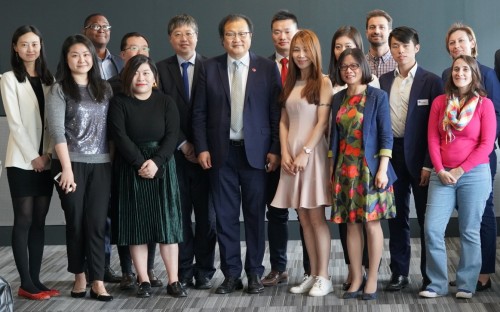CEIBS prides itself on its ‘China Depth, Global Breadth’ mantra. Covering the school’s MBA, I’ve been immersed a lot in the former, but this was a chance to revel in the latter—broadening MBA alumni horizons is a key aspect of that.
I met with Sharon Cheng at the entrance to the venue. Sharon is a part of the council for CEIBS’ UK Alumni Chapter. The chapter is one of many dotted around the world—other chapters include India, France, Switzerland, Singapore, and Germany—the goal of which is to strengthen global CEIBS MBA alumni relations.
Joining us was MBA professor of economics and finance at CEIBS, Xu Bin. He was due to give a lecture on US-China trade relations alongside Jin Xu, minister counsellor at the Chinese Embassy in London, who would speak of relations between the UK and China.
Over a lunch of Wester Ross salmon and pan-fried cod, conversation flowed. It was a chance to catch up on the latest overseas developments at CEIBS, to quiz Xu on his travel plans for London, and to catch a glimpse of Grand Designs presenter Kevin McCloud.
Then, to serious business—US China trade relations. In a conference room upstairs, we waited, as a flurry of CEIBS MBA alumni filtered through the door. There was a cacophony of nostalgia as old MBA peers caught up, took photos, and chatted vibrantly with Xu, retelling tales of his famous lectures.
The MBA graduates in attendance had undertaken an international exchange with London Business School during their degree. CEIBS is a member of Partnership in International Management (PIM), a global network of exchange universities to which MBA students go as part of the MBA international exchange initiative—most are included in the Financial Times’ Global MBA Ranking.
Minister counsellor Jin spoke first. “It will take a long time [to resolve],” he said of US China trade relations. “We have to have a win-win situation, but Donald Trump is a business person who wants to take advantage of other people.”
But the UK, Jin explained, is a viable trading partner for China if US relations turn sour. “Even after Brexit,” he suggested, “more investment will come to the UK. The Chinese people love UK culture, and they love doing business with the UK.
“We hope China could be as important for the UK as the US for trade.”
Next, when it came to professor Xu’s lecture, I understood why MBA students at CEIBS hold him in such high regard.
A technical malfunction meant it was a good ten minutes before the slideshow was up and running. Xu though, showcased his ability as a revered public speaker. “I’m now more of a talk show host,” he quipped. “If you are performing and something goes wrong, you have to continue to perform.
“This is the attitude I teach my students. If anything happens, you have to have a plan B, or a plan C!”
US-China trade relations, for him, are not at a level where they will descend into a trade war. 70% of Donald Trump’s demands will be met, he suggested. But, this comes down to more than just a spat over trade and tariffs.
“If I were US President, I would do the same thing,” Xu said. “Make sure that American voters see I am the person, or my party is the party, that can deal with [China].”
With the US midterm elections due later this year, it seems that Donald Trump's primary interest is to accrue quick domestic political wins to secure his short-term future. China, on the other hand, Xu explained, “is interested in establishing and preserving a global environment.”
Whereas Donald Trump’s perspective is very much about here and now, China’s leader Xi Jinping confirmed his long-term vision with a ‘new era’ for the nation. Taking China forward has involved President Xi surrounding himself with cabinet ministers who hold multiple perspectives, something Xu said Donald Trump hasn’t done.
What lesson is there in that for CEIBS MBA students? “If you only use people with the same views as you, then you are gone,” concluded.
CEIBS will be back in London on July 18th 2018, for a lecture by Dr Dipak Jain on 'Frameworks for Building and Sustaining Competitive Advantage'









